calsfoundation@cals.org
Poke Bayou (Sharp County)
Poke Bayou creek begins near Sidney (Sharp County) at Big Spring in Izard County, flows through Sandtown (Independence County), and empties into the White River just above the bridge at Batesville (Independence County). Izard County historian Denny Elrod stated the following about the area’s history: “It was to this creek many of the early settlers came. Across the White River from Poke Bayou is Wolf Bayou which hosted an Indian camp and trading-post. The creek is picturesque near Sandtown as it flows along the foot of overhanging bluffs.”
The original settlement at Batesville dates back to at least an 1814 trading post. When the first post office was established on the confluence of the bayou and the White River on November 7, 1820, it was called Poke Creek, with Charles Kelly, the county’s first sheriff, as postmaster. The name of the post office was officially changed to Batesville on January 7, 1824, for one of its leading citizens, James Woodson Bates. However, by 1860, the Independence County map showed a settlement upstream called Poke Bayou, near the Izard County line on the way to Wild Haws Landing, present-day Guion (Izard County).
The name Poke Bayou became official when the first postmaster, John Martin, was appointed on January 20, 1848. The post office was located in his general store, so locals began using the name “Martin’s Store” for the settlement but kept “Poke Bayou” for the name of the creek. Today, “Martin’s Store” is most often used to designate the historic site. The post office closed in 1894. The foundation of the store is still visible not far from the spillway at Flat Rock.
It is reported that one group of Cherokee camped at a spring in the area of Poke Bayou during the Trail of Tears journey. This may have been Big Springs in Izard County, which lies between Mount Pleasant (Izard County) and Sidney (Sharp County) at the headwaters of Poke Bayou. The group had followed Poke Bayou out of Batesville, camping at Flat Rock in what is today Sharp County the night before.
At least one large plantation was located at Poke Bayou on the eve of the Civil War. Following the Civil War, several African-American families received land in the area to farm. An African-American cemetery located on a farm near Flat Rock was later cleaned up and restored by the county historical society. An African-American church sat by the cemetery. Several black families in Batesville trace their roots back to the Poke Bayou settlement.
On March 10–12, 1864, a Union expedition of Company K, First Nebraska Cavalry Volunteers commanded by Captain Edward Lawler, traversed the Poke Bayou region. This maneuver is known as the Wild Haws Expedition (a.k.a. Strawberry River Expedition). No enemy contact was reported during the expedition.
The settlement of Poke Bayou, originally located in Independence County, became part of Sharp County when that county was created on July 18, 1868. The post office remained active until 1894 in Sharp County, but a short distance from both the Independence and Izard County borders.
By the beginning of the twentieth century, a school had been built at St. Paul near the Poke Bayou settlement to provide basic education for the youth in the area. The school building was eventually abandoned and burned in a wildfire.
Besides the fertile soil along the creek, another incentive to settle in the area was an important spring first called Howard’s Spring and later Stark Spring or Springs. The spring supplies water to surrounding communities such as Cushman (Independence County) in the twenty-first century.
Yet another economic force that encouraged settlement was manganese mining. By the mid-1880s, Walter Henderson Denison had begun work with the Keystone Mining Company at nearby Cushman. By that date, manganese mining was becoming a major economic activity in the county. M. McGee ran the Stark Spring washer for the W. H. Denison manganese mine at that location.
According to Ora Mae (Stewart) Lytle of Spring Mill, 183 families lived in the Stark hollow in the 1920s. The Lytle siblings delivered groceries there, with the oldest sister driving. John Lassiter and Nancy Ann Benton Lassiter ran a boarding house for the miners and their families. The mill dam was built in 1867 for Anthony N. Simmons by famed millwright Colonel John A. Schnable, whose name (along with the date of construction) is noted on a stone built into the dam. It is believed the mill building was constructed two years later.
The mill, which remained in operation until the 1960s, had a series of owners: James Miller and Thomas B. Roddy (1871–1873), Jordon James (1873–1913), C. W. McCrory (1913–1915), D. R. Headstream (1915–1917), J. W. Coop (1917), J. A. Lytle Sr. (1917–1935), J. A. Lytle Sr.’s heirs (1935–1938), and J. A. Lytle Jr. and the Lytle family (1938–2017). It was then purchased by Roy Gillihan, who began the process of restoration.
Poke Bayou (sometimes called Polk Bayou) is prone to devastating flooding during heavy rains; there were significant floods in December 1982 and March 2008. In 2010, the City of Batesville and the Arkansas Department of Parks and Tourism began developing the area to make it more accessible for boating and fishing. The old community of Poke Bayou, a.k.a. Martin’s Store, returned to nature, and the remains of the settlement are located on private property.
For additional information:
“Big Springs Cemetery.” Exploring Izard County. http://exploreizard.blogspot.com/2016/03/big-spring-cemetery.html (accessed September 10, 2018).
Cordes, Kathleen. America’s Natural Historic Trails. Norman: University of Oklahoma Press, 1999.
Pierce, Sam. “Stream-Clean.” Arkansas Democrat-Gazette, Three Rivers Edition, October 11, 2020, pp. 1S, 2S.
“Poke Bayou Traverse.” Exploring Izard County. http://exploreizard.blogspot.com/2009/03/polk-bayou-traverse.html (accessed September 10, 2018).
Varno, Susan. “Polk Bayou: Batesville’s Secret Stream.” Arkansas Democrat-Gazette, November 10, 2013, Three Rivers Edition. Online at http://www.arkansasonline.com/news/2013/nov/10/polk-bayou-batesvilles-secret-stream/?f=threerivers (accessed September 10, 2018).
Kenneth Rorie
Van Buren, Arkansas
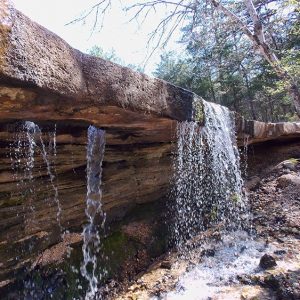
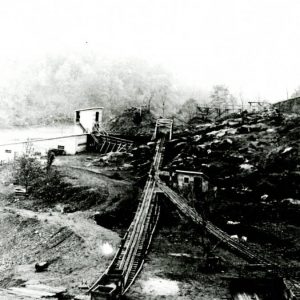
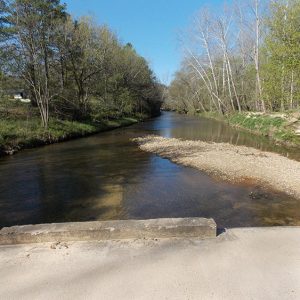
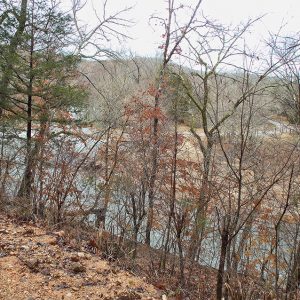
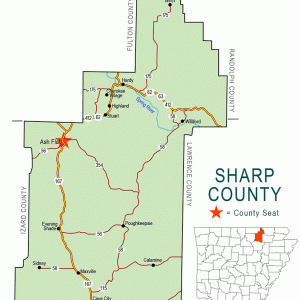




Comments
No comments on this entry yet.